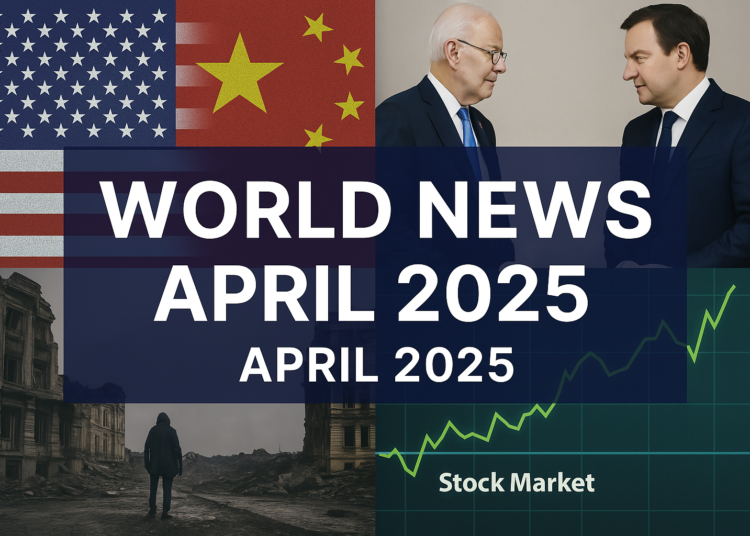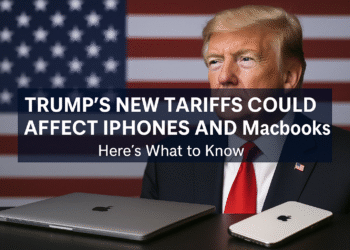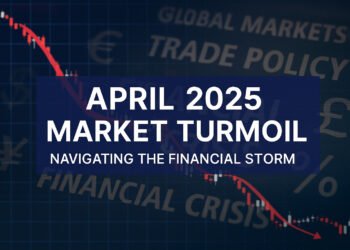World News April 2025 is marked by escalating trade conflicts, diplomatic challenges, and shifting geopolitical alliances. Here’s a comprehensive overview of the latest international developments.
U.S.-China Trade War Intensifies
China has responded to President Donald Trump’s recent tariff hikes by increasing its own tariffs on U.S. goods from 84% to 125%. This escalation has raised concerns about global economic stability and the potential for a prolonged trade war. Source
Diplomatic Efforts in Ukraine
President Trump has issued a stern warning to Russian President Vladimir Putin, urging a ceasefire in Ukraine. A U.S. envoy met with Putin to present a deadline for peace negotiations, aiming for an agreement by April 30. However, skepticism remains as Russia continues military operations and troop mobilizations. Source
Global Power Dynamics Shift
As the U.S. faces challenges in maintaining traditional alliances, China is expanding its global influence through strategic partnerships and economic initiatives. This shift is prompting concerns about the balance of power and the future of international cooperation. Source
Humanitarian Crises Escalate
The Red Cross has described the situation in Gaza as “hell on earth,” warning that hospitals are running out of supplies amid ongoing conflict. The international community is being urged to provide immediate assistance to prevent further deterioration. Source
Economic Outlook Amidst Uncertainty
BlackRock’s 2025 Global Outlook suggests that the world economy is moving beyond traditional boom-and-bust cycles, influenced by factors like AI, climate change, and geopolitical fragmentation. Investors are advised to focus on long-term thematic investments. Source
Global Markets React to Uncertainty
As geopolitical tensions rise and trade relationships are tested, global stock markets have shown increased volatility. The Shanghai Composite Index dipped 2.4% following China’s announcement of retaliatory tariffs, while European markets remained cautious as investors weighed the long-term impact of U.S. and Chinese policy shifts. Meanwhile, tech-heavy indexes such as the NASDAQ have experienced inconsistent gains, reflecting investor uncertainty around future trade agreements, AI regulation, and energy policy reform.
Currency markets have also responded, with the U.S. dollar strengthening against the euro and yuan, reflecting its status as a perceived safe-haven currency in times of global instability. However, economists warn that continued volatility could disrupt trade routes and complicate international supply chains if long-term agreements are not reached between the world’s largest economies.
Climate Diplomacy and the Global South
In the shadow of economic and military conflict, climate change diplomacy remains a key issue on the international agenda. Leaders from several African and South American nations are calling on wealthier countries to uphold commitments made during COP28, including funding for climate adaptation and carbon-offset programs. With the next round of negotiations scheduled for June 2025, global environmental groups are pressing for renewed urgency, especially as regions like sub-Saharan Africa and Southeast Asia face increasingly frequent climate-driven disasters.
Efforts to establish international cooperation on AI-powered environmental monitoring are also gaining traction. Several G20 members are exploring joint initiatives to track deforestation, carbon emissions, and water scarcity using satellite and machine-learning data, with the goal of making climate data more transparent and accessible to developing nations.
Global Health Watch: Outbreak Prevention and Preparedness
In global health news, the World Health Organization (WHO) has issued new guidance for pandemic preparedness, citing concerns about future zoonotic diseases and lessons learned from COVID-19. Several countries in Asia and Europe are participating in multinational simulation exercises to test healthcare coordination, vaccine stockpiling, and emergency communications. The WHO emphasized that “rapid information sharing and equitable vaccine distribution” remain key pillars in preventing a repeat of the delays seen during earlier global health crises.
Meanwhile, researchers in South Korea and Germany are developing AI-driven diagnostic tools to speed up virus detection in rural clinics. These technologies aim to bridge gaps in healthcare infrastructure while improving the world’s ability to respond to emerging infectious threats in real time.
Stay informed with WbTrends.com for continuous updates on these developing stories and more as we navigate the complexities of global affairs.



![Toronto Pearson Airport Shooting: 1 Killed During Security Incident [April 2025] 4 Toronto Pearson Airport Shooting: 1 Killed During Security Incident [April 2025]](https://wbtrends.com/wp-content/uploads/2025/04/7B64118D-687D-4453-AD1A-88FFA777F768-350x250.png)





